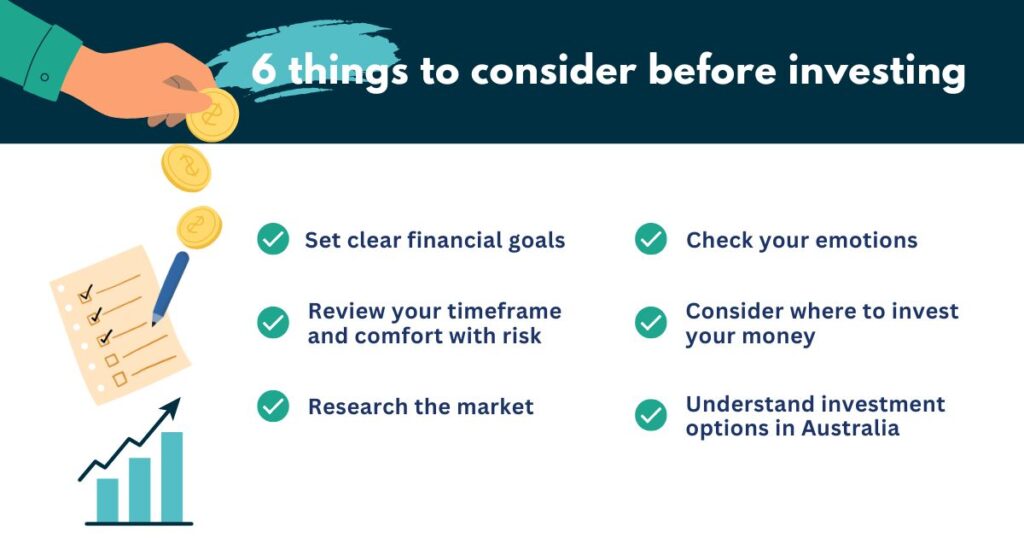6 things to consider before investing

Investing your money may be an effective way to help you build long-term wealth.
While it can seem overwhelming at times, given the breadth of options available, you don’t need to be a financial expert to be successful at it.
But as Warren Buffet says: “Risk comes from not knowing what you’re doing.[i] So understanding the basics is important.
To help you better prepare and potentially reduce your risk, here are some things to consider before investing.
1. Set clear financial goals
Before investing, consider creating a plan. This helps you put into perspective not only your investment goals, but when and how you want to achieve them. It can also help to remove the likelihood of emotions influencing your investment decisions.
Start by asking yourself what you aim to achieve through your investments. Are you looking to build wealth for retirement, save for a down payment on a house, or fund your child’s education? Your goals can influence your investment strategy and the level of risk you’re willing to take.
2. Review your timeframe and comfort with risk
Before investing, it’s important to consider how much time you’re giving yourself to build towards your financial goal and how much risk you’re prepared to take on to get there.
For example, an investment plan for retirement may look very different to someone who is much younger. If you’re looking to access your money in a shorter time frame, remaining invested through ups and downs in the market may be unlikely, so a less risky investment approach may work to your favour.
3. Research the market
Understanding what’s going on in the market, domestically and globally, is important as it may have an impact on your investments. This can include things such as growth, unemployment rates, interest rates and inflation and even political events.
4. Check your emotions
There’s no denying that the nature of investing can be emotional. There are times where you may feel tempted to change your investment strategy because an area of your portfolio isn’t doing well, or you received recent news the market is going to plummet.
While these events may cause you to react quickly, such as selling off your assets, it’s important to consider your investment strategy. If your approach is intended to be a long-term plan, making decisions based on short-term market fluctuations, may greatly affect what you set out to achieve.
5. Consider where to invest your money
You may choose to divvy up your money across a variety of asset classes such as shares, cash and bonds, or you may choose to invest your money in a single asset class, such as a residential property.
Diversification
One of the main advantages of investing in different asset classes, is the ability to diversify your risk. This means if one of your investments doesn’t perform well, your losses may not be as severe as your other investments will help to level it out. On the flip side, it does take more effort as you’ll need to remain up to date across a variety of market sectors.
6.Understand investment options in Australia
There are many ways you can go about investing your money depending on how confident you feel and whether you’d prefer to take a more passive or active approach to managing your money. Here are some of the most common:
- Shares: when you own shares in a company, you become a shareholder and have the potential to receive dividends (income distributions) and benefit from capital gains (profits when you sell the shares at a higher price than you bought them). The Australian Securities Exchange (ASX) is the primary platform for trading shares in Australia.
- Bonds: bonds are debt securities issued by governments, corporations, or other entities. When you buy a bond, you are essentially lending money to the issuer in exchange for periodic interest payments and the return of the bond’s value when it matures. Bonds are generally considered lower risk than shares but offer lower potential returns.
- Property: you can invest in residential or commercial properties, either directly by purchasing property or indirectly through real estate investment trusts (REITs). Rental income and property appreciation are common ways to generate returns.
- Managed funds: managed funds pool money from multiple investors to invest in a diversified portfolio of assets. Professional fund managers make investment decisions on behalf of investors, making them suitable for those who prefer a hands off approach to investing.
- Exchange Traded Funds: ETFs are similar to managed funds but trade like shares. They aim to replicate the performance of a specific index or asset class. ETFs offer diversification, liquidity, and lower risk to some other investment options.
- Term deposits and savings accounts: term deposits have fixed terms and offer a fixed interest rate, while savings accounts provide more flexibility but typically offer lower interest rates. They are suitable for conservative investors looking for capital preservation and a modest return.
- Super: super is a long-term savings vehicle designed specifically for retirement.
- Cryptocurrency: highly volatile, cryptocurrencies like Bitcoin and Ethereum have gained popularity as alternative investments. Some investors allocate a portion of their portfolios to cryptocurrencies for potential high returns, but they come with significant risk and should be approached cautiously.
Source: MLC
[i] https://www.cnbc.com/2017/05/01/7-insights-from-legendary-investor-warren-buffett.html



